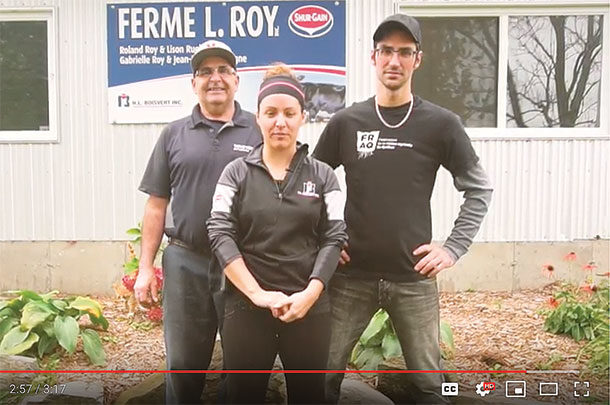Preliminary results of multiple studies presented in May 2019 by the scientist and her team show promise for new and innovative approaches to cow comfort and longevity.
Preliminary results to date:
- Existing tiestalls at the Macdonald campus barn were adjusted to deepen bedding using a bedding guard, increase the volume of straw used in bedding to 3 inches and increase the stall length, which resulted in increased lying times, less hock injuries, thus improving overall cow comfort. The study team cautions, however, that individual barn conditions like ventilation and humidity must be considered and management adjusted for a successful deep-bedded stall system.
- Increasing the tiestall tie length from 1 metre to 1.4 metres allowed for more opportunity for cow movement within a stall. The study team noted the change in tie length should be done gradually by choosing which cows benefit most from it and assess how the animal gets used to the change in tie length.
- Cows are using a variety of resting postures in wider stalls resulting in better cow rest, confirming that current recommendations for stall width must be met at a minimum.
- Housing dairy cows in loose pens during the eight-week dry period was beneficial for rest and locomotor recovery. These benefits can be attributed to a combination of factors: fewer obstacles in the environment (by eliminating the stall itself), a larger rest area, and a more comfortable lying area. This study established references to broaden the implementation of dry-off pens.
- Measuring the impact of early cases of mastitis and lameness on the productive life of a cow show a healthy beginning ensures a higher- profit lactation. Identifying at-risk stages of production and at-risk cows enables farmers to select the best candidates for next lactation.
- Key data is being collected on cost and profit variables farmers can use in their decision-making to develop an interactive herd management tool that will help improve the profitability and longevity of the herd.
Watch the video testimonial from the Roy family of Coaticook, Quebec, on YouTube on how they used some of the research recommendations to make changes on their farm to improve their cows’ comfort. ![]()
PHOTO: The Roy family of Coaticook, Quebec, provided a video testimonial on how they used research recommendations to improve cow comfort. Courtesy photo.
Dr. Elsa Vasseur obtained her PhD in animal science from Université Laval in 2009, looking at on-farm assessment tools for the welfare of young dairy animals. Following an NSERC Postdoctoral Research Fellowship where she worked with some of Canada’s leading researchers in dairy cattle welfare at the University of British Columbia and Agriculture and Agri-Food Canada, she took up a research position at the University of Guelph’s Organic Dairy Research Centre on the Alfred campus, before joining McGill University in January 2016.
Dairy Farmers of Canada (DFC) invests in research to stimulate productivity, sustainability and profitability on farms and to improve knowledge on milk and dairy products’ health benefits. DFC finances research initiatives that benefit all dairy farmers across Canada and works in collaboration with its members and other sectorial partners to target farmers’ priorities set in the dairy research and knowledge translation and transfer national strategies. Visit DairyResearch.ca for more information.










